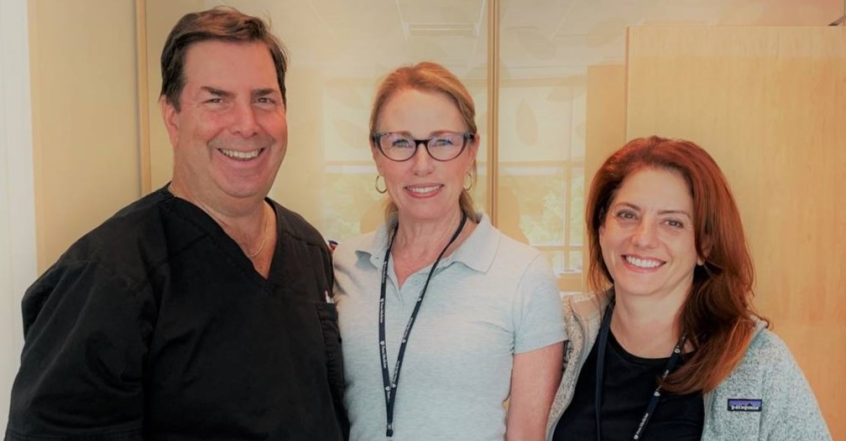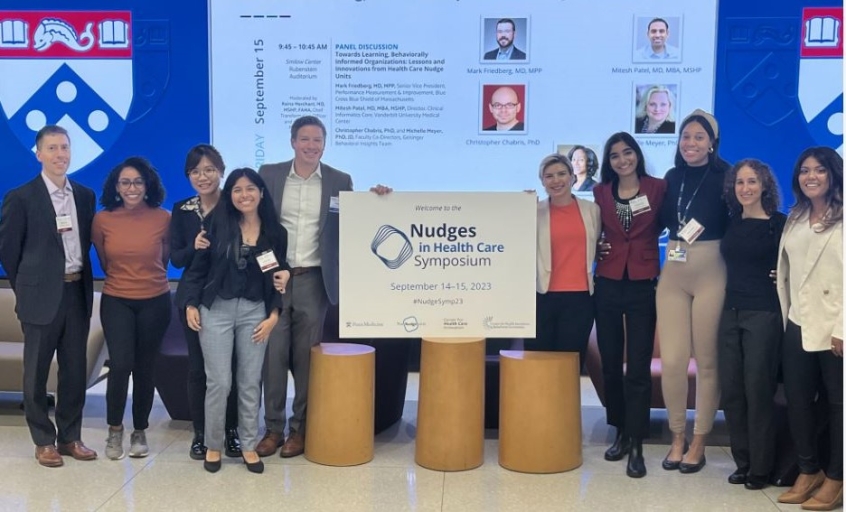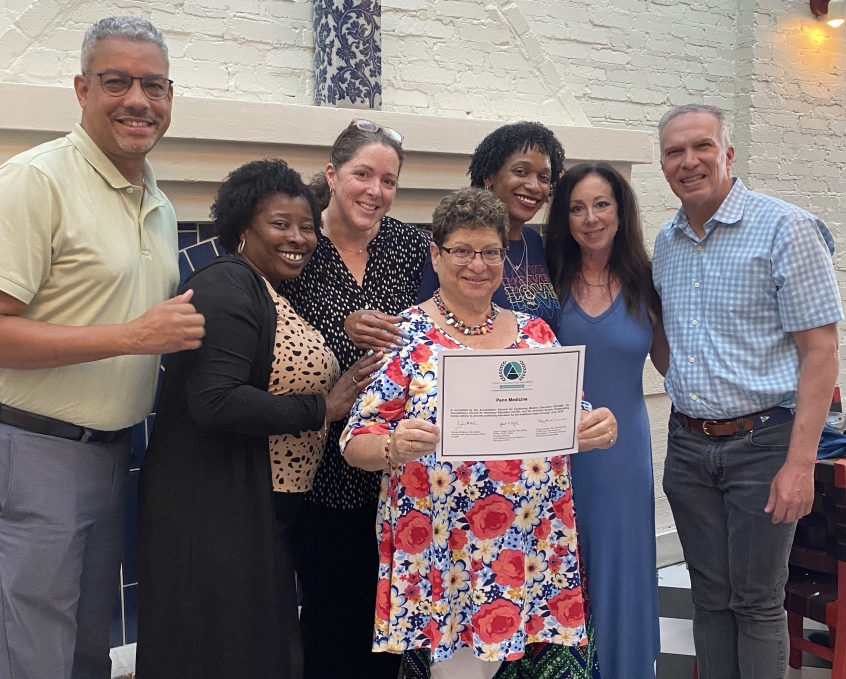Graduates of Penn’s Master of Health Care Innovation are improving processes and transforming care throughout the health system
by Stephanie Ostroff
A phone buzzes on a kitchen counter, resulting in a life-saving prescription refill.
A clinical department reduces insurance denials through behavioral science interventions and could save nearly $500,000 in a year.
A diabetic patient breathes a sigh of relief as she opens her lab results, blood glucose levels stabilized thanks to a carefully coordinated co-management program.
This is what innovation looks like in action.
“Anytime you improve something in a meaningful way or solve an important problem, you are innovating,” says Roy Rosin, MBA, Chief Innovation Officer at Penn Medicine. “Innovation to me has always been about effective problem solving. How do you identify problems? How do you understand them more deeply than they’ve been understood before? And how do you solve them not only more effectively, but in a way that captures the value that you create?”
It’s a philosophy familiar to graduates of the Master of Health Care Innovation (MHCI), which launched as the University of Pennsylvania’s first online Master’s degree in 2017. With multidisciplinary coursework spanning health policy, equity, behavioral economics, and operations management, the program emphasizes critical thinking to drive change in health care. The dynamic curriculum draws professionals from a diverse range of backgrounds.
“As an instructor, I have been delighted to see the breadth of participation,” says Rosin, who teaches Translating Ideas Into Outcomes, an MHCI course. “You have representation across nursing and pharmacy, surgeons and radiologists and associate CFOs and revenue cycle management.”
Today nearly fifty MHCI alumni and students work throughout the Penn Medicine health system, and they’re shaping solutions that improve lives from Lancaster to North Philadelphia.

Theresa Urban, MHCI ’21, calls herself a disruptor. As a Clinical Care Manager at Penn Family Medicine Valley Forge, she challenged the status quo by developing a Diabetes Co-Management program that’s balancing blood sugar levels for diabetics and optimizing care and costs beyond her own practice.
What began as a final project for her Pitching Innovation lab, a culminating MHCI course, has scaled in 2023 to include eight Penn Family Medicine practices. The program involves close collaboration between clinical care managers, pharmacists, and primary care physicians, leveraging their individual expertise to more effectively support patients as a whole. Its aim: reduce uncontrolled hemoglobin A1C levels while increasing reimbursement for value-based care through a high-touch, team-based approach.
"I was taught in the MHCI to get aligned with somebody that has a passion like you do, start small, scale, and just test your hypothesis to see if something works,” Urban says.
Within the first six months of rolling out her program in Valley Forge, 80% of patients reached their target A1C levels, and the practice reduced patients with uncontrolled diabetes by nearly 10%. Metrics like A1C have the potential to impact both patient health and the financial wellbeing of a health system in a value-based care reimbursement model.
“My big picture understanding is the more that we care-coordinate patients and keep them under control, the more money Penn will have,” says Urban. “And it’s not just diabetes–it’s hypertension, it’s everything.”
Urban began her program by partnering with Lou DeStefano, MD, a lead primary care physician at her practice in Valley Forge. Together they identified a group of patients with A1C levels above 9 scheduled for primary care appointments within a month. Urban looped in her clinic’s pharmacist, who conducted a comprehensive medication review with each patient before their appointment. Meanwhile, she spoke with them to assess barriers like lifestyle, social support, and finances. By the time DeStefano met with his patients in Valley Forge, the data necessary to maximize treatment efficacy was already at his fingertips.
“It ties into a lot of the things that Zeke talks about,” says Urban, referring to Ezekiel Emanuel, MD, PhD, faculty director of the MHCI. “Using all the professionals to support the providers. Maximizing people at their professional level of competency. Supporting the primary care provider in their role by adding the resources that they need to keep the patients here and well taken care of.”
Essential to the program is frequent follow-up from the clinical care manager, pharmacist, and medical assistants. The team coordinates to optimize prescriptions, provide education, and refer to other Penn specialists like social workers and nutritionists. It’s a formula that works, and it’s attracting interest. Urban and her team were invited to speak on a panel at the Center for Medicare & Medicaid Innovation annual conference. And at Penn, she’s found other primary care practices are eager to implement her project.
“I pitch it as: Let us help you. We’ve developed something that has really helped out the providers and patients. Why don’t we try it here?” Urban says. “Anybody that I talk to is like, ‘When we can we start?’”
At Chester County Hospital, Kevin Sowti, MD, MBA, MHCI ‘22, is giving frontline clinicians the tools to pitch and pursue passion projects. By developing an Innovation Hub, this Medical Director of Hospitalists hopes to empower early-career nurses and physicians in the trenches.
“I feel very strongly that there’s this problem with burnout now,” he says. “The problem is we don’t train physicians to be leaders, and often physicians aren’t really trained in quality improvement, process improvement, and innovation.”
Sowti is attempting to change that. Informed by MHCI courses like Health Care Operations and The American Health Care System, the Innovation Hub supports unit captains in identifying and implementing improvement projects. Nurses and physicians across eight units receive mentorship and experience pitching ideas, engaging stakeholders, and conducting contextual inquiry. Sowti likes to emphasize to his team that innovation is ultimately about improvement and “making our neighborhood better.”
“Sometimes it might be a small, incremental improvement,” he says. “But it’s about just continuously improving things towards perfection.”
Like many institutions of its size, Chester County Hospital lacks some of the resources available at larger hospitals, such as protected research time for providers and embedded quality improvement staff. For this reason, a traditional Unit Based Clinical Leadership program wasn’t a good fit.
We need to empower the people–the doctors and nurses that actually do the work–to improve quality and decrease costs, because I don’t think that answer is going to come from the outside.
~Kevin Sowti, MD, MBA, MHCI '22
Instead, Sowti molded the Innovation Hub to leverage the resources his hospital does have: passionate clinicians. They’re using the program as a springboard to tackle issues like C. diff infection reduction, length of stay, and improving communication with patients about side effects.
“We need to empower the people–the doctors and nurses that actually do the work–to improve quality and decrease costs, because I don’t think that answer is going to come from the outside,” he says.
One piece of advice Sowti shares with young health care leaders: enroll in the MHCI.
“If I had to do it over again, I would have gotten the MHCI earlier,” he says.
Building bridges between clinicians is a priority for Beth Horenkamp, MD, an MHCI student and Managing Physician at Penn Medicine’s Ann B. Barshinger Cancer Institute in Lancaster. As a medical oncologist and hematologist who sees head and neck cancer patients, she knows collaboration with other providers is essential. With patients shifting between office and hospital visits to undergo surgery and treatment, everyone needs to be on the same page.
Unfortunately, communication is often fragmented between specialties and practice locations. Since providers at Penn Medicine Lancaster General Health can’t message other Penn Medicine clinicians through Epic, the Electronic Health Records (EHR) system, critical follow-up sometimes looks like a patchwork of emails or phone calls.
Horenkamp sees room for improvement. Drawing inspiration from her Behavioral Economics and Decision Making class, taught by Kevin Volpp, MD, PhD, she’s leading a Coordination and Co-management Task Force for Head and Neck Cancer that’s streamlining communication across practice locations.
“We’re trying to use some of what I learned to manipulate people for good–to do the things that we really need to do,” says Horenkamp. “So it’s been helpful in thinking about how to get people to participate and do more co-management and coordination, which is going to improve patient care.”
Horenkamp and her task force are rolling out a platform that leverages Microsoft Teams to allow secure, easy exchange of messages, documents, and contact information across Penn’s head and neck cancer service line. The group of more than 200 professionals encompasses surgery, oncology, speech-language pathology, nutrition, social work, nursing, and many other disciplines.
“What kinds of things would actually engage people in a way that would make them like the platform as opposed to being frustrated by it?” Horenkamp considers. “That’s what I learned in the behavioral economics course. Feed them a piece of information, and then they have to engage with the information to retain it.”
Horenkamp will hold a gathering on Penn’s campus in November 2023 to familiarize specialists with the platform and one another in-person. She’s integrating principles of behavioral science into its design, aiming to facilitate widespread adoption of the new platform–with the goal of seamless communication between providers and stronger continuity of care for Penn’s head and neck cancer patients.

Behavioral science is the backbone of the Nudge Unit at Penn’s Center for Health Care Innovation. As its Director of Strategy and Operations, Neda Khan, MHCI ’21, puts into practice what she learned in class. Now, she wants to share those impactful strategies with a broader audience.
“Innovation is everywhere. It’s booming. But people don’t always have the tools to kind of start innovating or implementing nudges,” Khan says. “The MHCI provides a tool set for you as a student so you can go out and apply behavioral science and patient-centered design thinking in your own work.”
Since stepping into her role as director in January 2023, Khan has been developing a “Nudge Toolkit,” which she shared with operational leadership from Penn and external health systems at the Nudges in Health Care Symposium in September 2023. The toolkit offers a guide on how to implement nudges within organizations and is rooted in behavioral economics, pointing clinicians and leadership towards high impact nudges like financial incentives, defaults, and text message reminders.
“As an innovation center, we’ve been talking about: How do we leverage what we know works and scale that to other clinical domains across our organization—and how do we share these learnings with external organizations?” Khan says. “There are techniques we’ve learned over time that we could teach folks to implement on their own and disseminate.”
Khan has helped deploy these very techniques with the Nudge Unit, for example boosting statins adherence by swapping the default from a 30- to 90-day prescription refill. Such shifts require complex coordination among Information Services leadership, Clinical Informatics, and governance. But ultimately, they make it easier for providers and patients to do the right thing. During the symposium, Khan empowered others to move from idea to action.
“We would love to share out with internal as well as external folks how we’ve been navigating the waters,” she says. “Hopefully folks from different health systems can take that and apply it to their own systems.”
Khan is one of a few MHCI graduates employed at Penn’s Center for Health Care Innovation. Laura Kavanaugh, MHCI ’23, and Martina Plag, MHCI ’21, are Innovation Managers. Khan held that role before joining Cleveland Clinic as an associate director in 2022. She returned to Penn in 2023 to take on her current role.
“It’s exciting to see the MHCI has attracted more interest in working at Penn,” says Rosin, who also serves as Interim Executive Director at the Center for Health Care Innovation. “The fact that high-performing people are taking these roles and joining or rejoining the organization is meaningful. It’s attracting people to Penn who haven’t been here before, retaining people who have been here, but shifting their career path, or even engaging people to rejoin after they’ve left. All three of those are important paths for us.”
In her role as Innovation Manager for the center’s Way to Health platform, Martina Plag, a former standardized patient educator at Penn, helps develop and implement clinical interventions delivered via text message. Drawing from her education, she focuses on finding what’s broken before trying to fix it.
“So many people come to us with a solution.” She challenges them, “Let’s step back. Let’s define the problem.”
Using contextual inquiry, a skill honed during her MHCI, Plag conducts on-the-ground research for screening outreach and medication adherence programs. She’s walked alongside substance use navigators, kidney transplant coordinators, and other frontline workers, spotlighting barriers and opportunities.
So many people come to us with a solution. Let’s step back. Let’s define the problem.
~Martina Plag, MHCI '21
“It’s really good to have the background of the Master of Health Care Innovation with all its components: the law and health equity components, rapid cycle testing, and then also principles of behavioral economics and problem defining,” says Plag. “That combination was really magical and that comes together here.”
Plag is leveraging contextual inquiry to uncover and close gaps in communication, delivering life-saving treatment sooner. For example, kidney transplant recipients depend on anti-rejection medication, but prescription refills can fall through the cracks. Plag’s research found that well-timed, high-touch engagement can make a difference.
Now a program her team is piloting includes a dedicated Penn pharmacy technician for prescriptions, early contact with patients to make a refill plan, and carefully synchronized text messages that can escalate to a kidney transplant coordinator. Plag is hopeful this formula could eventually be applied to all solid organ transplant recipients, reducing surgeries and saving lives.

Taking on a new role at the peak of a crisis is a challenge for even the most seasoned of leaders.
Fortunately, Bruce Brod, MD, MHCI ‘20, had honed the very skills he needed to steer his team through a tight accreditation deadline when he became Associate Dean of Continuing Medical Education and Interprofessional Collaboration in 2023. He seized the opportunity to deploy problem-definition and leadership tools he developed during his master’s program.
“The MHCI taught me to take a step back and look at the problem at hand and filter out some of the distractions,” he says. “I think just knowing: ‘You were taught this. You can do this.’ Without it, it would have been really tough.”
Brod has a long history at Penn—beginning as an undergraduate, then as an MD student. In 1998, he joined Penn faculty as a Clinical Professor of Dermatology, eventually serving as Director of the Occupational Dermatology and Contact Dermatitis Clinic.
Seeking to expand his leadership competencies, Brod enrolled in the MHCI in 2018. The degree inspired him to take on new responsibilities with an eye toward broader health system impact. When he began his position with the Office of Continuing Medical and Interprofessional Education, he found a real-world test case for the concepts he’d studied in a leadership class taught by Wharton’s Michael Useem, PhD.
“We talked about leading in times of crisis—it was critically urgent,” he says. “When I came, the program was facing an accreditation deadline of three months. This is a process that normally can take up to a year to prepare for, and the team was new to me. We were starting from scratch, and the stakes were high, because if a program doesn’t get accredited, the institution can’t provide continuing education.”
Borrowing from the “leadership checklist” he’d developed in the MHCI classroom, Brod took a boots-on-the-ground approach, prioritizing in-person meetings with small groups and individuals. He set realistic timelines and kept the focus on what was on the line: medical professionals’ education and the health system’s reputation. Then he jumped right in alongside his team to help get the job done.
“I was keeping those concepts in my mind–like ‘leader eats last.’ I might have just said, ‘I shouldn’t be doing all this stuff. The staff should be doing it.’ But they didn’t have a clear roadmap to do it, and that was the situation at hand,” Brod says. “It gave me a lot of comfort to know that this is what happens at times, because of the things I learned.”
A team effort earned the department Accreditation with Commendation status through July 2029 from the Joint Accreditation for Interprofessional Continuing Education.
“I can tell that putting those lessons into action, it turns out better,” Brod says. “The team responds better. They appreciate it. They acknowledge it.”
Rebecca Carpenter, MHCI ‘22, has found plenty of opportunities to apply innovation principles as Director of Revenue Cycle Management for Neurosurgery and Neurology. She began working at Penn in 2016 as a Health Information Management Coding Specialist while completing her bachelor’s degree. Within three years, she moved into a director role. In 2020, she enrolled in the MHCI to round out her health care and leadership expertise.
“What I really enjoyed about the program is that there are so many opportunities to use your real-life work examples in the learning you’re doing,” she says. “It can be very easily translated into what you’re doing on a daily basis.”
Carpenter is using behavioral science knowledge to cut down on authorization-related insurance denials, a longstanding issue in her department. She has shifted the way she communicates with providers, reconsidering when and how she shares data with them to maximize buy-in. When denials happen, Carpenter streamlines her approach to managing them, for example utilizing templates specific to each payor.
The multi-pronged effort has made a difference, saving her department a monthly average above $40,000 in authorization-related write-offs in 2023 compared to the prior year.
“I would say that those changes were informed by the aspects of MHCI that focus on process improvement and removing unnecessary steps,” says Carpenter, citing Health Care Operations, taught by Wharton’s Christian Terwiesch, PhD, as particularly valuable.
While she is already reducing denials and capturing revenue, Carpenter hopes to make an even greater impact by collaborating with Corey Feldman, MHCI ‘21, as he launches a startup, CoveredHealth.ai, that seeks to address these challenges.
“I’m giving my insight from deep in the weeds of these issues to see what kind of technology and AI they can create and build to resolve things,” she says. “It’s still in its infancy in terms of if we can bring something like this to Penn, but it’s been really exciting to have conversations that wouldn’t be happening if I hadn’t gone through the program."
When the MHCI was launched in 2017, its vision was clear: attract, and then tap into, the collective change-making potential of a diverse network of health care leaders through engagement with renowned Penn faculty and one another.
“MHCI was developed to help clinicians and other professionals in the health care trenches improve their skills while continuing to work,” says Zeke Emanuel, founding MHCI Faculty Director. “We wanted them to develop interventions, improve quality, and reduce costs. With deep understanding of the system, behavioral economics, operations, as well as case examples of system improvement, our graduates are empowered to fix problems and get the solutions embedded in their practices, hospitals, and organizations.”
MHCI alumni apply new tools to prevent and manage disease, optimize resources, and improve the health care system for all. At Penn Medicine, the impact ripples across disciplines and departments, touching providers, staff, and patients. The future is made brighter as the MHCI brings together even more people passionate about tackling the field’s deepest challenges.
Stephanie Ostroff is a speech-language pathologist and journalist. She enjoys blending knowledge from both fields to shine a light on innovators and changemakers in health care.

